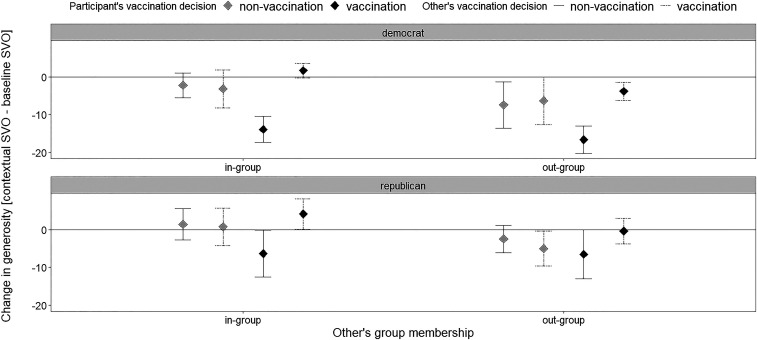Korn et al. (1) present evidence that vaccination constitutes a “social contract.” In three controlled experiments, participants who chose to be vaccinated in an experimental vaccination game (I-Vax) (2, 3) reduced their generosity toward unvaccinated, but not toward vaccinated, others. This was the case regardless of group membership, which was operationalized using a minimal group paradigm. The authors acknowledge that the external validity of their results may be limited due to the use of minimal, rather than natural, groups (as in ref. 4), and the reliance on an experimental game, rather than on real vaccination choices/intentions, to model vaccination behavior.
The potential lack of external validity is of particular concern in the context of the current COVID-19 pandemic and the political climate in the United States. As vaccines have been recently made available to the public, social issues that stem from the willingness or refusal to be vaccinated are relevant as never before. The fact that, at least in the United States, vaccination has become a partisan issue (Democrats are more willing to be vaccinated than Republicans) further emphasizes the importance of understanding how vaccination may be related to broader social issues.
I address these limitations by testing a variation of the experiments reported in ref. 1. In the new experiment (preregistration: https://aspredicted.org/blind.php?x=6nu3dm), group affiliation is based on participants' identification with either the Democratic or Republican party in the United States, and the willingness to be vaccinated is based on participants’ self-reported agreement to be vaccinated against COVID-19. Other than these differences, the participants, experiment, and analysis closely follow those reported by Korn et al. (1). Participants (n = 185) were Amazon Mechanical Turk users from the United States. Each participant indicated whether or not she would agree to be vaccinated against COVID-19 if a Food and Drug Administration–approved vaccine was available at no cost; positioned herself on a Democrat−Republican scale; and completed a social value orientation (SVO) measure (5) five times, first with no information about the other person (baseline), and then with another person who either agreed or did not agree to be vaccinated, and supported the Democratic or Republican party (contextual SVO). The dependent variable was the difference in generosity between the baseline SVO and each of the four contextual SVO measures.
The results closely replicate the original findings (Fig. 1). Participants who agreed to be vaccinated (83% of Democrats, 44% of Republicans; these figures are close to those obtained in nationally representative US polls, e.g., ref. 6) were less generous toward others who did not agree; those who refused to be vaccinated hardly differentiated between vaccinated and nonvaccinated others. Participants were less generous toward outgroup members, but this effect did not interact with agreeing to be vaccinated. Thus, changes in generosity were not particularly pronounced toward nonvaccinated outgroup members.
Fig. 1.
Mean changes in generosity as a function of political affiliation, other’s group membership, other’s vaccination decision, and participant’s vaccination decision. Error bars represent 95% CIs; n = 185. Nonvaccinated participants (gray symbols) do not change their generosity based on the other’s vaccination behavior or group membership. Vaccinated participants (black symbols) condition their generosity on the other’s vaccination behavior, adhering to the “vaccination as a social contract” hypothesis: They reduce their generosity toward nonvaccinated others (solid error bars) compared to vaccinated others (dash-dotted error bars). This effect does not depend on group membership. Adapted from ref. 1, which is licensed under CC BY 4.0.
The original results obtained by Korn et al. (1), together with the robustness test described here, provide strong support for the hypothesis that vaccination is indeed a social contract that is not conditional on group membership, even when the groups are extremely opposed on numerous issues, including COVID-19 vaccinations.
Footnotes
The author declares no competing interest.
References
- 1.Korn L., Böhm R., Meier N. W., Betsch C., Vaccination as a social contract. Proc. Natl. Acad. Sci. U.S.A. 117, 14890–14899 (2020). [DOI] [PMC free article] [PubMed] [Google Scholar]
- 2.Böhm R., Betsch C., Korn L., Selfish-rational non-vaccination: Experimental evidence from an interactive vaccination game. J. Econ. Behav. Organ. 131, 183–195 (2016). [Google Scholar]
- 3.Böhm R., Meier N. W., Groß M., Korn L., Betsch C., The willingness to vaccinate increases when vaccination protects others who have low responsibility for not being vaccinated. J. Behav. Med. 42, 381–391 (2019). [DOI] [PubMed] [Google Scholar]
- 4.Weisel O., Böhm R., “Ingroup love” and “outgroup hate” in intergroup conflict between natural groups. J. Exp. Soc. Psychol. 60, 110–120 (2015). [DOI] [PMC free article] [PubMed] [Google Scholar]
- 5.Murphy R. O., Ackermann K. A., Handgraaf M. J., Measuring social value orientation. Judgm. Decis. Mak. 6, 771–781 (2011). [Google Scholar]
- 6.Hamel L., Kirzinger A., Muñana C., Brodie M., KFF COVID-19 Vaccine Monitor: December 2020. KFF (2020). https://www.kff.org/coronavirus-covid-19/report/kff-covid-19-vaccine-monitor-december-2020. Accessed 27 January 2021.



